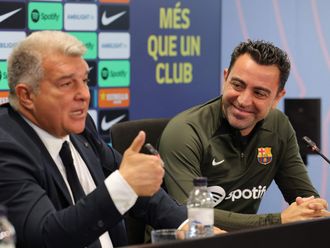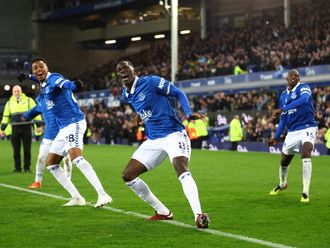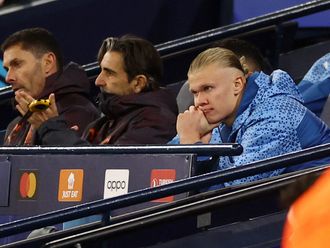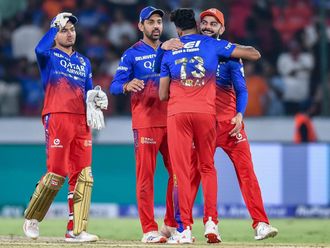
Dubai: Elias Andersson combined with Gustav Engvall for Sweden’s first goal of the Under-17 World Cup. These are two blond-haired, blue-eyed boys with very Swedish names, but it soon became clear that the yellow-clad team competing in UAE is anything but homogeneous. There are 11 different nationalities in the 21-man squad, with players tracing their roots to ports as far afield as Seoul and Kampala, Banjul and Tirana.
The story begins with Valmir Berisha. Born in Albania before moving with his family to Sweden when he was two, the star had scored four goals in the tournament prior to Tuesday’s semi-final with Nigeria in Dubai. “It’s important for us as a team to have more than just one kind of player,” said the flamboyant No 9. “Swedish players are known for being strong and fast. But when you throw in the technical ability of the guys like me from the Balkans and the good stuff the African guys bring too, the power and technique, we become more than just one threat.”
Gentrit Citaku also has Albanian roots and his delicate through-ball picked out Erdal Rakip, of Turkish origin, who slotted home to send Sweden on their way to victory in the quarter-final against Honduras. Having already made his senior team debut for Swedish giants Malmo, it’s likely this won’t be the last Sweden jersey the impressive Rakip pulls on before his career is over.
The tall and powerful Carlos Strandberg has come on as a late substitute in all of Sweden’s games. “My mother’s from Portugal with roots in Mozambique,” Strandberg, who combined with Anton Saletros, son of a Hungarian immigrant, for the winning goal against Honduras, told Fifa.com. “My dad, he’s Swedish, so there’s the Strandberg.
“There are guys from all over the world in this team and it’s a really cool thing for us.”
Sweden’s other goal was scored by none other than the sensational Berisha, who celebrated like a madman. “I still don’t know what I was doing after the goal,” he said of the bouncing, pogo-ing dance performance that followed his cheeky heel-flick in Al Ain. “I needed to watch the highlights on TV to find out.”
Wherever their roots originate, this Swedish team have amazing chemistry, humility, good humour and, perhaps most of all, resilience. They lost their top midfielder, Isak Ssewankambo — who hails from Uganda — to injury after only 15 minutes of football at the finals. With arguably their best midfielder sent home to Chelsea, where he’s already agreed to professional terms, the Swedes soldiered on without him.
“The power in depth of this team is just amazing,” said coach Roland Larsson, who had made three substitutions — the maximum allowed — in every game prior to the semi-finals. “It’s a tremendous feeling for a coach.”
Larsson’s defence is marshalled by Noah Sonko, a tall and rangy centre-back who traces his roots back to Gambia, a west African country not far from Nigeria, who just happen to be Sweden’s next opponent. “I’m not worried about them at all; not bothered one bit,” was Sonko’s response when asked about the pace and creativity of Nigeria’s attacking line, who have scored 20 times in five games. One wonders if his mates in defence, identical twin brothers Sebastian and Johan Ramhorn — who share a Korean mother — will have the same level of comfort when the goal-hungry Golden Eaglets come calling a second time.
Ali Suljic and speedy winger Mirza Halvadzic come from Bosnia, while Christer Lipovac hails from Croatia. Goalkeeper Sixten Mohlin’s blood flows from the Netherlands and the Cape Verde Islands, off the north-western coast of Africa. The story goes on and on. Even the team’s medical staff is of Italian ancestry. Clearly, it’s all one, big happy family for these Swedes, who are breathing new life into the old cliche ‘variety is the spice of life’.











